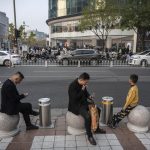She still sends money to her older sister — but stopped giving funds to her son and daughter, both in their early 30s, about three years ago.She’s hesitant to give details — and even asks that an alias be used rather than the American name she’s known as in the salon — but told the New York Post she disapproved of the expensive handbags, makeup and clothes she found out her married daughter was buying. She was less forthcoming about her son, but said he lived above his means in a way that was foreign to her. She said she doesn’t know if he has credit card debt.“I’m scared to find out,” Angela said. “I don’t ask but I tell him ‘no more money’.”Angela said she hasn’t seen Squid Game, the number one show on Netflix and a cultural juggernaut that shines a hard, if metaphorical, light on South Korea’s high cost of living – and the massive credit card debt and shame that goes along with it.“I know what it’s about,” she said. “There may be some truth to it but it also makes us (South Koreans) look bad.”Unfortunately for Angela, the wildly popular and violent series about 456 desperate, debt-ridden South Koreans playing a series of children’s games to see who will survive and win a multimillion-dollar prize — and who will be shot in the head at point-blank range — is not going away. Earlier this month, Squid Game creator Hwang Dong-hyuk confirmed he will make a second season.But Squid Game didn’t come out of thin air. Analysts of both South and North Korea told The Post the series illustrates the flip side of the so-called “Miracle on the Han River” – the astonishing rise of the South Korean economy since the end of the Korean War.In 1953, more than half the population of South Korea lived in abject poverty and more than half were illiterate. But by the end of 1996, the country had become the 29th member country of the OECD, which is made up of advanced countries.But South Koreans, especially Millennials and the even younger generation, paid a price for such rapid growth in such a short amount of time, experts say.“South Koreans were so eager to have better times because we had to go through such hard times,” Jinah Kwon, a lecturer at the Graduate School of International Studies at Korea University told The Post. “That eagerness to have a better life led them to do everything they could. But all that compressed capitalism made everything a little crazy.”Kwon said the education system in particular — especially since the 1970s — was very tough on Korea’s kids. Kwon routinely went to school at 8am, not returning home until 11pm.But, despite all those years of study and hard work, South Koreans under 40 face daunting economic challenges.Household debt in South Korea, where an average house can now cost upward of a million dollars, has skyrocketed in recent years and is now the highest in Asia. It’s now almost double the US average, according to statistics from Nodutdol, a New York-based Korean diaspora organisation.The average Seoul household is $US44,000 in debt, according to a 2018 study from the Seoul Institute. Credit cards with enormous limits are easy to obtain — and the impulse to use them is made worse by the intense competitiveness of South Korean society, Kwon and others said.South Korea has one of the highest suicide rates in the world. Suicide has been the number one cause of death for young people since 2007, according to a 2020 report from Statistics Korea.“South Korea can be very unforgiving,” Greg Scarlatoiu, the executive director of the Committee for Human Rights in North Korea who lived in Seoul for 20 years with his South Korean wife, told The Post.“This is a country that’s undergone spectacular changes and growth in a relatively short time. A lot of people have been left behind. Many got into debt because of the incredible pressure to keep up, to be the best and purchase the best. They see no way out.”“Shame is very big in Korean culture,” he added. “They call it choi moyon — saving face. In the US, failure is the mother of success. You can declare bankruptcy and no one thinks anything of it. Look at Trump. In South Korea it’s very hard to come back from failure.”Squid Game creator Hwang’s inspiration for the series came from his own financial crises, the worst of which occurred after the global meltdown in 2008.“I was very financially straitened because my mother retired from the company she was working for,” Hwang, who has refused interviews in recent weeks because he was so overwhelmed with requests, told The Guardian last month. “There was a film I was working on but we failed to get finance. So I couldn’t work for about a year. We had to take out loans — mother, myself and my grandmother.”Hwang took refuge in Seoul’s comic book cafes, reading survival books like Liar’s Game.“I related to the people in them, who were desperate for money and success,” he said. “That was a low point in my life. If there was a survival game like these in reality, I wondered, would I join it to make money for my family?”Squid Game came out of an amusement he played as a child that’s not unlike tag and involves tracing squid shapes on a field.“I used to be good at fighting my way to the squid’s head,” Hwang said. “You had to fight to win.”Though Hwang has seen much of the world, not just South Korea, locked in a type of Squid Game because of increasing economic inequality, he said the problem is particularly bad in his homeland.Gordon Chang, author of Losing South Korea, said it’s no coincidence that Squid Game and another Hollywood juggernaut — the Oscar-winning film Parasite — show South Koreans in a poor light.“The filmmakers are leftist and they’re from a generation in South Korea that hates America,” Chang said. “They’ve made South Korea look horrific — even though it’s really not that bad. They all think they’re involved in this existential struggle.”Chang added that the leftist government of South Korean president Moon Jae-in is trying to “destroy democracy and restore unification with North Korea”.And it all adds up to great propaganda for North Korean leader Kim Jong-un, experts say.“Kim’s got to be thrilled at how South Korea is being depicted to the world,” Michael Madden, a nonresident fellow at the Stinson Center and an expert on North Korea, told The Post. “He’s always railing about the influence of the West and the consumerism of South Korean and American society. He’s got to be loving Squid Game.”Kim has been known to rail against what he calls the “decadent lifestyle” of the West. Though he and his family are known for their secret consumption of a wide variety of luxury products imported underground from overseas, Kim presents himself as a stern nationalist out to preserve traditional Korean values.North Korean state media has called Squid Game an example of the “beastly” nature of a “South Korean capitalist society where mankind is annihilated by extreme competition”, depicting an “unequal society where the strong exploit the weak.”But Sean King, an Asia specialist at Park Strategies, said he disagrees that Squid Game is a take-down of South Korea and its people.“What Squid Game does is allow people in other countries to see South Koreans as people with the same problems they have,” King said. “They can relate to South Koreans more. It humanises them even if they are being shown in a bad light. It makes them more like us, which long-term is not good for Kim.“He doesn’t like people relating more to South Koreans.”This article originally appeared in the New York Post and has been reproduced with permission
Powered by WPeMatico






